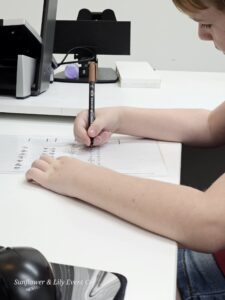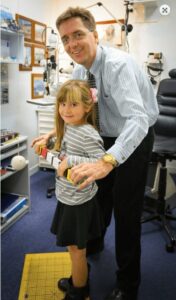Children’s Vision
At Buck and Todd Optometrist we offer full child visual assessment as well as an extensive Behavioural Optometry service. Behavioural optometry investigates and manages the effects of visual information processing on attention and learning.
Behavioural optometry is an approach to vision care that aims to maximise visual function in all aspects of life. It is not just about your child’s ability to see well, but their ability to process what they see in a comfortable manner, which will affect how they view and respond to the world around them. This tends to be a more holistic approach as it tries to incorporate the physical, neurological and developmental aspects of vision.
The way we achieve this is by scheduling two appointments, the first with our optometrist who will conduct a full eye health and function evaluation and the second with our visual therapist who assesses your child’s reading, writing and comprehension. All findings are reviewed and detailed in a final report which is send to the family and any health professionals or teachers. Parents are able to book a results discussion appointment with the optometrist to ask any questions about the report and possible interventions to help their child’s vision.

Goals of Behavioural Optometry
- To provide intervention for visual/eye problems which have developed either due to a miss-adaptation in functional development (eg. eye turn, short-sightedness) or as a result of injury /incident (head injury, concussion or stroke)
- Develop and enhance the visual skills needed to achieve more effective visual performance while learning in the classroom, workplace, playing sport etc.
- To prevent problems from developing. Environmental influences and unbalanced visual systems can contribute to the development of myopia and strabismus; these may be prevented through the use of glasses for reading and/or eye exercises.
We provide an in-depth examination of visual abilities, including a comprehensive eye health examination which incorporates examining your child’s focusing skills, eye teaming (the ability to use both eyes together) and eye movement control. There will also be assessments on spatial judgment (knowing where things are in space) and the ability to process visual information (understanding what you see), as well as assessment of auditory processing.
If indicated through assessment the assessment, we will further investigate for visual stress. The visual therapist does this by using coloured overlays to assess the effect of colour on reading. Intuitive colourimetry may be required as a supplementary assessment should overlays prove effective. We not do diagnose Dyslexia or its variants.

Who may benefit from Behavioural Optometry?
Patients of all ages would benefit from a more in depth approach but particularly those between the ages of 6 and 17 who suffer visual fatigue and vision stress, those with eye motor control problems, lazy eyes, developmental delays, neurological damage or learning delays.
Whilst the visual system in adults is less adaptive to learning/ change, Behavioural Optometry may be suitable for adults if their condition is considered by the optometrist to be amenable with this treatment.
How is a Behavioural Optometrist different?
Behavioural optometrists complete post-graduate education to further their knowledge in programs that can prevent or eliminate visual problems and enhance visual performance. Working alongside vision therapists we endeavour to help all facets of vision processing rather than just visual acuity.
Not all optometrists practice Behavioural Optometry, but those who do implement neuro-developmental and functional optometry.